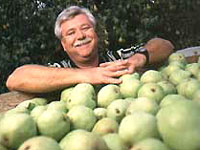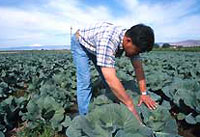Scott Exo is program director of The Food Alliance, a nonprofit organization dedicated to promoting environmentally and socially responsible agriculture.
Thursday, 31 May 2001
PORTLAND, Ore
PORTLAND, Ore. Good morning! I’m Scott Exo, program director at The Food Alliance. My goal today is to find two Food Alliance-approved farmers to commit to doing a demo of their products in a participating grocery store.
While it takes some logistical work to get a farmer into a grocery store, especially during harvest season, we make it a priority for two reasons. First, demos increase product sales almost without fail. Second, connecting the consumer face-to-face with local farmers is a pretty unique experience, and reminds people that food doesn’t just come from grocery store shelves. These good old-fashioned interactions create a bond between consumers and farmers, and give farmers the opportunity to tell customers what is special about their farm.
Successful demos send a real vibe throughout the store. The combination of the aroma, the conversation, the delicious product, and the philosophy behind our name results in a meaningful experience for the shoppers and the farmer.

Apple and pear grower Gary Wells.
My first call will be to John Wells of Wells and Sons Orchards in Hood River, Ore. Operations at Wells and Sons Orchards are divided among the family members: Gary, Maureen, John, Carolyn, Jim, Jean, and Scott Wells. The Wells grow apples and pears, and I’m particularly eager to have John demo their fruit in a supermarket, as they utilize really innovative pest and disease management practices.
In 1996, John tested pheromone-mating disruption, a new technique to control codling moths. Codling moths lay eggs in fruit and the larvae eat the young pears. Codling moths don’t see very well and only fly at night. The female moths rarely fly at all. They sit on branches and release pheromones so that the male moths know where to find them. At bloom time, John places dispensers in his orchard that release clouds of pheromones. Males fly around looking for females to mate with, but the scent of pheromones is so overpowering, they never can find the females. The males die frustrated, and the females never have a chance to mate and create new codling moths. When successful, this method obviates the need for pesticides. After early experimentation with the technique, John found pheromone-mating disruption to be so successful, he placed dispensers on 115 acres. This is the type of agricultural innovation we want consumers to hear about, so I’m eager to provide an opportunity for John to tell his story.
My second phone call of the day is to Lon Inaba of Inaba Produce Farms, Inc. in Wapato, Wash. Lon and his family grow asparagus, peppers, cabbage, cucumbers, beans, onions, peas, corn, zucchini, tomatoes, and watermelon on 1,200 acres.

Lon Inaba checks his crops.
Lon has two Department of Health-licensed housing structures for his farmworkers. He took out a low-interest Farmers Home Administration loan for the materials, and with the aid of his workers, built housing that has earned praise from the Washington Governor, the EPA, and the Washington State Department of Community Development. Because of the steps Lon has taken to ensure a healthy work environment, many of his employees return each year, providing him with a knowledgeable and well-trained staff.
The Food Alliance is proud to provide our seal of approval to farmers like Gary and Lon. We’re working hard to connect consumers to the men and women who put food on their tables. So don’t be surprised to see a Northwest farmer serving up asparagus in your neighborhood market sometime soon. And if you do, stop by and give Food Alliance-approved a try. You won’t be disappointed!

